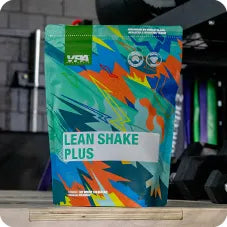Your Cart is Empty
Plant Protein vs Whey Protein: Which is Better for Your Fitness Goals?
December 18, 2024 8 min read

You might be bombarded with hundreds of options when deciding the best protein for your fitness goals. The choice isn’t easy and can be overwhelming since it concerns your health and overall well-being. Indeed, it’s a dilemma - deciding between Plant protein and Whey protein when each offers unique benefits depending on dietary preferences, health goals, and lifestyle. Whether you want to build muscle, gain or lose weight, support general wellness, or follow a sustainable diet, understanding the differences between plant and whey protein is key.
So fret not! We have brought you the most comprehensive guide that dives deep into plant protein vs whey protein, exploring their nutritional profiles, health benefits, digestibility, environmental impact, and more. By the end of a good read of this article, you'll be better equipped with the best protein powder to suit your needs.
Understanding Protein Types: Whey Protein vs Plant-based Protein
As an essential macronutrient, protein is required by kids, infants, and adults alike for muscle build, general bodily functions, tissue repair, and support general muscle growth. While protein powders offer a convenient, versatile, and “packed-with-flavours” alternative to fulfil daily protein requirements, they should always be treated as a supplement to a balanced diet. Indeed, protein powders are excellent supplements, and before delving deeper into the intricacies, let’s try to understand each protein source and what they offer—starting with Whey Protein.
What is Whey Protein?
Whey protein is a complete source of proteins derived from milk during cheese-making. Once the solid part (curd) separates from the liquid whey, it is processed and powdered to create whey protein supplements. One of the best protein sources, courtesy of its high-quality amino acid profile, is whey protein - favoured by gym and fitness geeks as a supplementary protein source to enhance muscle growth and recovery.
There are three primary forms of whey protein:
-
Whey Protein Concentrate (WPC): Whey Protein Concentrate contains 70–80% protein with moderate fat and carbohydrate levels for faster absorption. VPA’s Whey protein concentrate (WPC) is a whey concentrate that is perfect for building muscle, feeling full longer, and losing fat. It provides an everyday protein boost with low fats and carbs.
-
Whey Protein Isolate (WPI): Processed to remove almost all fats and carbohydrates, thus isolated to provide up to 90% protein content.
-
Whey Protein Hydrolysate (WPH): Pre-digested for faster absorption, Hydrolyzed Whey suits those with sensitive digestion.
Whey protein is regarded as a complete protein with nine essential amino acids. It is particularly valued for its high concentration of branched-chain amino acids (BCAAs), especially leucine, vital for muscle protein synthesis.
What is Plant-Based Protein?
For the vegan or lactose-intolerant gym goers, plant-based protein powders derived from plant sources such as soy, peas, hemp, rice, quinoa, and pumpkin seeds are whey alternatives. When different plant protein sources are combined, they create a complete protein profile that is a superb choice for those following vegetarian, vegan, or environmentally conscious lifestyles.
Some popular plant-based protein sources include:
-
Soy Protein: A complete, fulfilling choice, soy protein contains all nine essential amino acids and is a top choice for muscle recovery and growth.
-
Pea Protein: Derived from yellow split peas, it is rich in BCAAs and easily digestible.
-
Hemp Protein: Offers a mix of protein, fibre, and healthy fats, along with omega-3 and omega-6 fatty acids.
-
Rice Protein: High in essential amino acids, particularly methionine, rice protein is often combined with pea protein for a complete profile.
Take, for example, VPA’s Premium Plant Vegan Protein Powder. It’s 100% natural, certified vegan, and athlete-approved premium plant vegan protein and comes in various flavours like chocolate, salted caramel, vanilla, and banana. Made up of ingredients like pea protein isolate, rice protein, BCAA Blend, etc., it is a perfect source of protein for vegans and lactose-intolerant gym-goers.
Plant Protein vs Whey Protein: What Are the Differences?
| Criteria | Whey Protein | Plant Protein |
| Source | Dairy-based (from milk) | Plant-based (soy, peas, hemp, etc.) |
| Amino Acid Profile | Complete (all essential amino acids) | It can be incomplete but combinable to build a complete protein profile. |
| Digestibility | Fast absorption | Moderate to slower absorption |
| Diet Suitability | Since whey protein is derived from milk, it is unsuitable for vegans or lactose-intolerant individuals | Vegan-friendly and allergy-inclusive |
| Environmental Impact | Higher ecological footprint | More sustainable |
| Taste Profile | Creamy and smooth due to milky profile | Varies by source; often nutty or earthy taste |
Nutritional Profile Comparison
Amino Acid Content
When it comes to plant protein vs whey, the latter is often recognised as the “gold standard” in protein supplements because of its complete amino acid profile. As discussed above, it contains all nine essential amino acids, including leucine. Workouts cause muscle tears, and these repair and grow through a process called muscle protein synthesis. Leucine aids this process.
However, plant proteins like pea, soy, and hemp may lack one or more amino acids but can be combined to achieve a complete profile. For example, combining pea protein (low in methionine) with rice protein (low in lysine) results in a full amino acid spectrum ideal for protein supplementation.
Macronutrient Balance
Whey protein, particularly whey protein isolate, is low in carbohydrates and fats, making it an excellent option for those seeking lean muscle gains or weight management.
On the other hand, plant-based proteins often come with added nutrients such as fibre, antioxidants, and healthy fats, contributing to overall wellness and a lower environmental footprint.
Health Benefits
Benefits of Whey Protein
-
Muscle Growth and Recovery: Whey protein’s fast absorption and high leucine content make it ideal for muscle repair and growth.
-
Immune Support: Contains immunoglobulins and lactoferrin, which boost immunity.
-
Weight Management: Increases satiety, keeping stomach fuller for long, thus aiding in appetite control.
-
Improved Strength: Whey protein consistently enhances muscle strength when combined with resistance training.
Benefits of Plant-Based Protein
-
Heart Health: Naturally low in cholesterol and saturated fats, plant protein supports cardiovascular health.
-
It’s not just protein: Plant proteins provide all kinds of nutrients - fibre, vitamins, minerals, and phytochemicals not found in whey.
-
Allergy-Friendly: Plant-based proteins are suitable for those with dairy allergies or lactose intolerance.
-
Sustainability: A greener choice with a smaller environmental footprint.
Digestibility and Absorption
When it comes to plant protein vs whey, whey protein is rapidly absorbed, making it ideal for post-workout consumption. Its high bioavailability ensures that the body efficiently uses the amino acids for muscle repair. Hydrolysed whey is particularly pre-digested to improve absorption.
In contrast, plant proteins like pea and hemp are digested more slowly. Although, that is good news for all the vegans and sustainability lovers out there. Owing to a sustained release of amino acids, plant-based protein powders offer prolonged energy and satiety throughout the day.
Environmental Impact and Sustainability
Since whey protein is a by-product of cheese making, its production involves dairy farming, which has a significant ecological footprint. High water consumption and greenhouse gas emissions make whey protein production less sustainable. In contrast, plant-based proteins like hemp and pea require fewer resources and generate less environmental impact.
In choosing between plant protein vs whey protein, let us remember that plant protein supports sustainability and aligns with environmentally conscious living, specifically lifestyles supported by the vegan community.
Dietary Considerations
Suitability for Restricted Diets
-
Whey Protein: Not suitable for vegans or individuals with lactose intolerance, though whey isolates may work for those with mild intolerance.
-
Plant Protein: Perfect for vegan, vegetarian, and dairy-free diets, as well as those with specific food allergies.
Potential Allergens
In vegan protein vs whey, whey protein can trigger lactose intolerance or dairy allergies, whey alternatives like soy protein may also be allergenic. Many consumers are allergic to soy; in such cases, alternatives such as pea and hemp protein are generally hypoallergenic and suitable for most people.
Cost and Accessibility
Whey protein is widely available but is more expensive, particularly in the heavily processed isolate and hydrolysate forms. Initially costlier due to niche demand, plant-based proteins are now competitively priced and accessible as their popularity grows with a growing vegan populace.
Fitness Goals: Tailored Protein Solutions
Whey Protein for Muscle Building
Whey protein is preferred for muscle growth and recovery thanks to its rapid digestion and high leucine content. High-protein, low-calorie powders like isolate and hydrolysed are best for building lean muscle mass. For athletes and bodybuilders, consuming whey post-workout helps maximise muscle protein synthesis.
VPA’s Whey Protein Isolate is among the best and highly-rated and reviewed whey proteins available for Australian gym-goers. As one of the fastest-digesting whey proteins, it is excellent for fast post-workout recovery. With minimal fats, carbs, and calories, it serves as a high-protein supplement without the added pounds.
Plant Protein for General Wellness
Plant-based proteins support overall health. As discussed above, their versatile nutrient content, slower absorption, and sustainability make them ideal for individuals aiming for a balanced and healthy lifestyle.
Consumer Preferences and Taste Profiles
Often smooth and creamy, whey protein’s neutral taste (or added flavour availability) makes it versatile for mixing with shakes, smoothies, or water. Plant proteins, while often grainy or earthy, have significantly improved with advancements in flavour technology. Brands now offer plant protein powders in various appealing flavours, including chocolate, vanilla, and banana.
Backed by Science: What the Experts Say: Whey protein vs. Plant-based protein
There is no clear winner in the war between vegan vs. whey protein. Whey protein has superior ability and a long-standing reputation for stimulating muscle protein synthesis due to its leucine content and rapid absorption. However, research also shows that when combined strategically (e.g., pea + rice protein), plant-based proteins can match whey’s effectiveness in supporting muscle growth and recovery. This makes plant protein as viable as whey for athletes and fitness enthusiasts.
Choosing Between Plant Protein and Whey Protein
Factors to Consider:
-
Dietary Restrictions: Plant-based protein is the clear choice if you're vegan.
-
Fitness Goals: Whey protein may provide an edge for rapid muscle growth.
-
Sustainability: Choose plant proteins if reducing your carbon footprint is a priority.
-
Health Needs: Opt for plant protein if you prefer added nutrients like fibre for overall well-being.
Conclusion
The debate between plant protein vs. whey protein is ongoing. It’s safe to claim that both plant protein and whey protein offer unique advantages, and the best choice depends on your individual goals, dietary needs, and lifestyle. Whey protein is an excellent option for muscle growth and recovery, while plant proteins provide additional health benefits and align with sustainable practices. By following this detailed guide and understanding the differences, you can select a protein source that best supports your fitness journey.
FAQs
Which protein is better for overall health, plant or whey?
In plant protein vs whey, plant protein may improve overall health due to its added nutrients and lower environmental impact.
How do the absorption rates of plant and whey protein compare?
Whey protein absorbs faster, making it ideal for post-workout recovery, while plant protein provides a sustained release of nutrients, keeping you full for longer.
Can you effectively build muscle with plant protein?
Yes, especially when combining sources like pea and rice protein to create a complete amino acid profile.
Which protein type is recommended for weight loss?
Whey is often recommended due to its high protein content and low carbs, but plant proteins with high fibre content can also aid in satiety and control excessive hunger pangs.
How do whey and plant proteins affect cholesterol levels?
When it comes to whey protein vs plant-based protein, whey protein may reduce bad cholesterol, while plant proteins are naturally cholesterol-free, supporting heart health.
What are the potential disadvantages of using plant protein powders?
Some may have a gritty texture or incomplete amino acid profiles, requiring a combination with other proteins.
Is plant protein healthier than whey protein?
It depends on your health goals and dietary needs. Plant protein is generally lower in allergens and higher in nutrients. It is exceptionally safe for consumers suffering from lactose intolerance.
What is whey protein derived from?
It is a byproduct of cheese-making, sourced from milk.
Is whey protein suitable for those who are dairy-intolerant?
Not typically, but whey protein isolate may work for those with mild lactose intolerance.
Are there environmental benefits to choosing plant protein over whey protein?
Yes, in plant protein vs whey, plant protein has a smaller carbon footprint and uses fewer resources to produce.
What should you look for when choosing a plant or whey protein powder?
Check for high protein content, low additives, and the proper health certifications.
Can plant and whey proteins be combined in a diet?
Combining both can provide complementary benefits, giving you a complete dietary supplement.
References
Hidden, M. (2024, June 14). Plant-Powered Performance: Can Plant-Based Protein Powders Keep Up with Whey in 2024? Vesper Tool. Retrieved from https://vespertool.com/blog/plant-base-protein-powders-and-whey/
Davidson, K., & Fernando, I. (2024, August 26). Plant-Based Protein vs. Whey Protein: Which Is Better? Healthline. Retrieved from https://www.healthline.com/nutrition/whey-vs-plant-protein
Integris Health. (2023, August 1). Whey Protein vs. Plant-Based Protein. Integris Health. Retrieved from https://integrishealth.org/resources/on-your-health/2023/august/whey-protein
Gupta, A. (n.d.). Whey Protein vs Plant Protein: Which One Is Better for You? Health Shots. Retrieved from https://www.healthshots.com/healthy-eating/nutrition/which-is-better-plant-based-protein-or-whey-protein/
Also in Supplements

The Ultimate 12-Week HYROX Training Plan (Beginner-Friendly + Expert-Approved)
December 04, 2025 7 min read
Read More
What Is HYROX? The Complete Beginner’s Guide to the World’s Fastest-Growing Fitness Race
December 04, 2025 8 min read
Read More
The Ultimate HYROX Fuel Plan: When and How to Use Energy Gels for Maximum Output
October 15, 2025 6 min read
Read More Recent Articles
- The Ultimate 12-Week HYROX Training Plan (Beginner-Friendly + Expert-Approved)
- What Is HYROX? The Complete Beginner’s Guide to the World’s Fastest-Growing Fitness Race
- The Ultimate HYROX Fuel Plan: When and How to Use Energy Gels for Maximum Output
- Collagen for Tendon Repair: Can Supplements Support Recovery?
- What Is Creatine Monohydrate? Benefits, Safety & How to Use It
- How Is Creatine Made? (Natural, Synthetic & Quality Standards Explained)
- What’s the Best Creatine in Australia? Here’s Why Monohydrate Still Reigns Supreme
- What Is Whey Protein? A Beginner’s Guide
- 7 Best Protein Powders in Australia (Taste-Tested August 2025)
- Why Does Beta‑Alanine Cause Tingling? (What’s Behind the Beta‑Alanine Tingle)
${{amount}}













